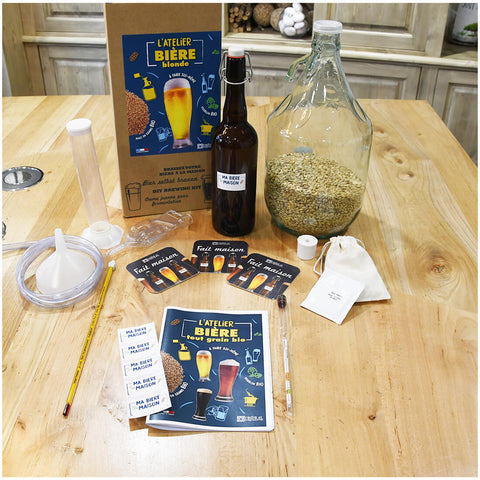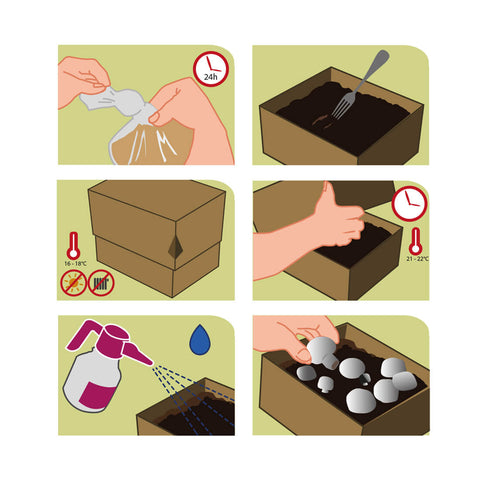Brewing beer at home is an attractive hobby that combines art, science and the immense pleasure of enjoying your own product. Thanks to the very popular "Beer Brewing Set", more and more people are opting for this hobby, because in this set you have all the instructions for the beer brewing process and all the necessary tools. So you don't have to buy anything at all.
But before you start brewing beer, you need to have the key ingredients and knowledge for successful brewing. This set is also recommended for beginners; the key is to read the instructions beforehand and follow them:
https://gardenshop.hr/collections/ekolosko-kuhanje-piva/products/set-kuhanje-svijetlog-piva-za-4-liter
Let's get to know the main characteristics for making beer
🌿 Basic understanding of the beer production process
Before you start brewing, it's important to understand the basic steps in the beer-making process. Home brewing typically involves milling barley, maceration, mash cooking, fermentation, conditioning, and finally bottling or pouring the beer. Each step has its own specifics and requires different skills and attention.
🌿 Home brewing equipment
Starting a brewery requires certain basic equipment:
-Boiling Cauldron: Used to cook desserts with the addition of hops.
-Fermentor: The container in which beer fermentation takes place, whether it is glass, plastic or stainless steel.
-Cooking cooler: A device for rapidly cooling a boiling dessert before fermentation.
-Filling system: includes bottles, caps and bottle filler.
🌿 Beer ingredients
The basic ingredients of beer are water, malt (usually barley), hops and yeast. The quality of the water greatly affects the final product, so it is important to use clean and suitable water. Malt gives the beer body and sweetness, while hops give it bitterness and aroma. Yeast is responsible for fermentation, converting malt sugars into alcohol and carbon dioxide.
The set also contains a bag of sweet extract powder, a bag of dry yeast, and a bag of hops.
🌿 Beer brewing process
Precision and patience are very important in this process. The process begins with the grinding of malt, followed by maceration, where sugars are extracted from the malt. After maceration, boiling is followed by the addition of hops according to a specific schedule to achieve the desired aromas and bitterness. After boiling, the dessert must be cooled and transferred to a fermenter, where yeast is added. Fermentation takes from several days to several weeks. After fermentation, the beer is often aged to stabilize and improve the flavors.
🌿 Hygiene and cleaning
Perhaps the most important aspect of home brewing is maintaining cleanliness and hygiene. All equipment must be thoroughly cleaned and sterilized to prevent contamination and ensure the quality of the beer.
🌿 Legal regulations
Before you start brewing, inform yourself about local laws and regulations governing home brewing. In some countries, brewing beer at home is restricted or even prohibited.
🌿 Communities and resources
For additional information and support, you can turn to local and online brewing communities where experienced brewers share their knowledge and advice. There are also many homebrewing books, online courses and guides available.
Home brewing is a great opportunity to experiment with different styles and ingredients that allow you to create a unique beer.
🌿 Experimenting with recipes
Once you have mastered the basic techniques of brewing beer, you can start experimenting with different types of malt, hops, additives and fermentation techniques. Changing the amount of hops, the type of yeast or adding ingredients like spices, fruit or even coffee can lead to completely new and unique flavours. This is a particularly fun job where your creativity can really come to life.
🌿 Getting feedback
It's also important to share your beer with others. Getting feedback from friends, family, or members of a brewing club can help you improve your beer. Every critique is an opportunity to learn and improve the brewing process.
🌿 Establishing a routine
Brewing beer regularly helps you hone your skills and understand how different parts of the process affect the final product. Establishing a routine where you brew regularly, analyze the results, and make adjustments is key to gradually improving the quality of your beer.
🌿 Education and further learning
Brewing is a field where new techniques and knowledge are constantly emerging. Attending workshops, reading professional publications, and taking brewing classes can help you stay up to date with the latest trends and methods. In addition, you can also earn certifications such as the Beer Judge Certification, which gives you a deeper understanding of beer sensory analysis.
🌿 Enjoying the process
After all, home brewing is a hobby that should bring joy and satisfaction. Enjoy the creative process, collaborate with other brewers, share your products, and above all, savor every sip of your unique beer.
Starting a home brewing business is an adventure that requires patience and experimentation. With the right approach and dedication to learning, your home brewing project can grow into a passion that brings satisfaction with each new beer. May your brewing be successful and your beer always delicious!



